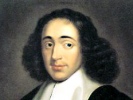
Sacred Texts Philosophy Spinoza Index Previous Next
Buy this Book at Amazon.com


Correspondence, by Benedict de Spinoza, [1883], at sacred-texts.com
[Spinoza answers that he does not know what ghosts are, and can gain no information from antiquity. (The Hague, Sept., 1674.)]
Dear Sir,—Your letter, which I received yesterday, was most welcome to me, both because I wanted to hear news of you, and also because it shows that you have not utterly forgotten me. Although some might think it a bad omen, that ghosts are the cause of your writing to me, I, on the contrary, can discern a deeper meaning in the circumstance; I see that not only truths, but also things trifling and imaginary may be of use to me.
However, let us defer the question, whether ghosts are delusions and imaginary, for I see that not only denial of them, but even doubt about them seems very singular to you, as to one who has been convinced by the numerous histories related by men of to-day and the ancients. The great esteem and honour, in which I have always held and still hold you, does not suffer me to contradict you, still
less to humour you. The middle course, which I shall adopt, is to beg you to be kind enough to select from the numerous stories which you have read, one or two of those least open to doubt, and most clearly demonstrating the existence of ghosts. For, to confess the truth, I have never read a trustworthy author, who clearly showed that there are such things. Up to the present time I do not know what they are, and no one has ever been able to tell me. Yet it is evident, that in the case of a thing so clearly shown by experience we ought to know what it is; otherwise we shall have great difficulty in gathering from histories that ghosts exist. We only gather that something exists of nature unknown. If philosophers choose to call things which we do not know "ghosts," I shall not deny the existence of such, for there are an infinity of things, which I cannot make out.
Pray tell me, my dear Sir, before I explain myself further in the matter, What are these ghosts or spectres? Are they children, or fools, or madmen? For all that I have heard of them seems more adapted to the silly than the wise, or, to say the best we can of it, resembles the pastimes of children or of fools. Before I end, I would submit to you one consideration, namely, that the desire which most men have to narrate things, not as they really happened, but as they wished them to happen, can be illustrated from the stories of ghosts and spectres more easily than from any others. The principal reason for this is, I believe, that such stories are only attested by the narrators, and thus a fabricator can add or suppress circumstances, as seems most convenient to him, without fear of anyone being able to contradict him. He composes them to suit special circumstances, in order to justify the fear he feels of dreams and phantoms, or else to confirm his courage, his credit, or his opinion. There are other reasons, which lead me to doubt, if not the actual stories, at least some of the narrated circumstances; and which have a close bearing on the conclusion we are endeavouring to derive from the aforesaid stories. I will here stop, until I have learnt from you what those stories are, which have so completely convinced you, that you regard all doubt about them as absurd, &c.